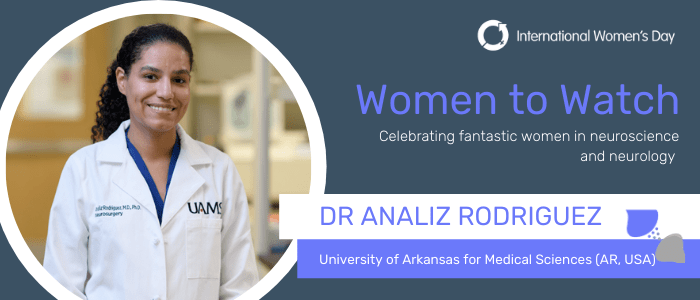Women to Watch: developing precision medicine therapies for brain tumor patients with Dr Analiz Rodriguez

As part of our ‘Women to Watch’ series on Neuro Central, we’re putting Dr Analiz Rodriguez into the spotlight. Dr Rodriguez is an Assistant Professor of Neurosurgery and Director of Neurosurgical Oncology at the University of Arkansas for Medical Sciences. She specializes in the surgical treatment of brain tumors and runs an independent translational laboratory. Her lab focuses on the development of precision medicine therapies for brain tumor patients using genomics and transcriptomics.
In her role as Director of Neurosurgical Oncology, Dr Rodriguez oversees the clinical trials, research initiatives and educational efforts related to brain and spine tumors in her department. As they are the only academic medical center in a rural state, Dr Roriguez also conducts research on access to neurosurgical care and how to reduce healthcare disparities.
What inspired you to become a brain tumor neurosurgeon?
I was inspired to become a neurosurgeon by watching a program on TLC (i.e., the learning channel). I saw a story about a little girl who had a large portion of her brain removed to cure epilepsy. I thought it was amazing and decided that’s what I wanted to do “when I grew up”. When I entered the MD/PhD program, I was fascinated by cancer biology, but it wasn’t until residency that I knew brain tumors would be my subspecialty. Brain tumor surgeries were always my favorite and I still was inclined towards cancer research. I was certain it was for me when I talked to a patient with glioblastoma multiforme about life and his relationship with God after his diagnosis. It was the first time I prayed with a patient and I was blown away by the powerful moment. The relationship you have with a patient who has cancer is indescribable. It is uniquely spiritual and I have learned more about the purpose of life through the eyes of my patients than any other experience. I also enjoy helping my patients fulfill their goals and to find peace/happiness during their journey.
What are the best aspects of your job? What are the most challenging parts?
One of the best parts of my jobs is restoring neurological function. It truly feels like a miracle having a patient not walk or talk, but then after surgery they can again. It happened just earlier today when I was rounding on one of my patients. That joy is overwhelming and I am grateful that I can change someone’s life in a positive, impactful way. The most challenging part of my job is the stress. Neurosurgery has great rewards but also great losses. We have the ability to restore function but also the ability to take function away. The risks are like no other field. Specifically, for brain tumors, I am challenged daily by aggressive cancers. The majority of my patients have malignant brain tumors with limited therapies and will likely die within 2 years of me meeting them. That personally motivates me in my research because I know what happens when you run out of options. It keeps me up at night and I remember my patients’ faces and stories.
Have you faced any obstacles in your field due to your gender?
It’s no secret that neurosurgery is a male-dominated field. I will say that being a minority woman gives you a unique perspective. I am Afro-Latina and throughout school as a child was often the “only” one. I have been marginalized since I was a child so entering neurosurgery was not a new experience for me. In talking to some of my majority women peers, entering a male-dominated field was the first time they were identified as an “other”. This was not my experience since I always have been an “other” in various groups for my entire life. Due to the intersectionality of my race, ethnicity and gender, it is difficult for me to identify what obstacles were due to my gender solely. However, I can say that for women in surgery the following obstacles are usually present: 1) it takes more time to gain people’s respect, and 2) women tend to be judged more harshly than men. These sentiments towards women are pervasive in our society and not specific to any certain field.
Did you notice any difference in opportunities available to women, or in how you were treated, as you gained more senior positions over your career?
As a resident, I noticed that over time people knew me and it was easier to gain their confidence. I currently work in a very supportive environment in which 4/10 neurosurgery faculty are women. Every now and then I’ve had someone treat me differently because of my gender. I call them out on it and engage my more senior mentors to resolve a conflict if needed. These rare incidents perturb my utopian balance, but I think the biggest shift I have seen is that women are empowered to speak up more in the workplace.
In your opinion, what more could be done to promote gender equality in your field?
There have been initiatives to encourage more women to apply for neurosurgery residency. The effects of these efforts are starting to be seen as we are inching closer and closer to 20% of women entering neurosurgery per year. Unfortunately, multiple studies have demonstrated attrition rates among women are higher than men and we need to seriously address this issue as it is a “leak” in the already small pipeline. The other area to promote gender equality is to have more women leaders. I see this changing as more women in the last 5 years have been appointed chair of a neurosurgery department. It will take time to change the environment and bring in more diversity. I am hopeful that the trend will continue and the future of neurosurgery will include equal pay, meritocracy-based promotions and generous parental leave for all.
What advice would you give to young women hoping to pursue a career in your field?
Very good question! I am starting to realize the impact of being a mentor and have had many conversations with young women. Neurosurgery is a difficult field to enter for everyone, so you have to be sure it’s for you. As a woman, you likely will get discouragement and be told to enter less rigorous fields. I usually tell a young woman to be bold and take what you want in life. Don’t let others squash your dreams with some petty, misinformed comments. I also advise cultivating a support network, investigating the culture of various programs and investing in scheduled wellness activities to avoid burnout.
Lastly, do you have any role models who are women that have inspired you?
I have a lot of women I admire but will only mention those I know personally. First and foremost, my mother Angela Rodriguez who remains the hardest worker I know. She gave me the greatest gift you can give a little girl, which is unwavering self-confidence and she brings levity to my serious life. Dr Betsy Glass was my high school biology teacher who encouraged me to pursue the science fair and ultimately inspired me to do an MD/PhD program. Dr Deborah Blades who was the first Black woman neurosurgeon I met and welcomed me to her home for mentorship in medical school. There are many more women role models but these three have had a significant role to inspire me in becoming a neurosurgeon–scientist.
Acknowledgements
This interview was put together and conducted by our Senior Editor, Sharon Salt, with written responses provided to us by Dr Analiz Rodriguez.
Disclaimer
The opinions expressed in this interview are those of the interviewee and do not necessarily reflect the views of Neuro Central or Future Science Group.
You might also like:



